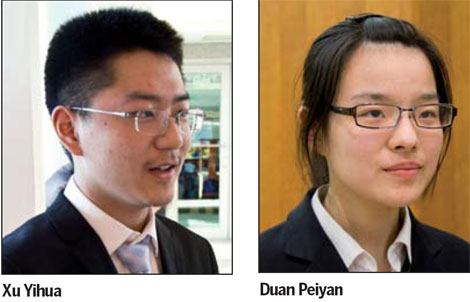Chinese teens discover success at Intel international science fair
Updated: 2012-06-01 10:52
By Liu Yiyi and Cong Yan in New York (China Daily)
|
||||||||

Young scientists from China won 11 prizes at the 63rd annual Intel International Science and Engineering Fair, a record for a Chinese team.
This year, 27 Chinese contestants involved in 19 research projects took part in the world's biggest international precollege science competition.
The team was feted at a reception hosted by China's consul general in New York recently after results from the May 13-18 fair were announced.
Xu Yihua, 19, from Bengbu in eastern China's Anhui province, won first place in animal science. His project is focused on preventing bees from pesticide toxicity. Xu discovered that bees could be poisoned by pesticides while harvesting honey. The current solution is replacing poisoned bees with normal one, which is inefficient and risks contamination of the honey.
"I started to do the project last spring and wanted to find a better solution," he said. "I want to extract the effective components from lavender, ay tsao and mosquito grass, which would keep bees away. I also want to draw more scientists' attention to this issue."
Xu plans to do follow-up research on the project. He is a liberal-arts major who will take the national college-entrance exam in June but has already been enrolled by the law school of Wuhan University in central China. He would like to attend a US university, particularly Stanford in California.
Duan Peiyan, a first-place winner in biochemistry at Intel ISEF, impressed the judges with her research of an anti-diabetic compound in foxglove (digitalis), a plant used in traditional Chinese medicine, with the help of a computer program to analyze its molecular mechanism of action.
Intel ISEF, which this year was held in Pittsburgh, provided teenagers interested in science an opportunity to meet with peers from all over the world, Duan said.
The leader of the Chinese team, Meng Xing, highlighted the influence of the competition on the attitude of her young charges. "Our overseas experience is very helpful for the organization of domestic science competitions for teenagers. This will engage more teenagers in China in the sciences."
Intel ISEF annually draws more than 1,500 high school students from about 70 countries, regions and territories to showcase their independent research as they compete for over $3 million in prizes.
Since 2000, 299 Chinese students involved in 200 projects have competed in Intel ISEF and won 188 awards.

 Relief reaches isolated village
Relief reaches isolated village
 Rainfall poses new threats to quake-hit region
Rainfall poses new threats to quake-hit region
 Funerals begin for Boston bombing victims
Funerals begin for Boston bombing victims
 Quake takeaway from China's Air Force
Quake takeaway from China's Air Force
 Obama celebrates young inventors at science fair
Obama celebrates young inventors at science fair
 Earth Day marked around the world
Earth Day marked around the world
 Volunteer team helping students find sense of normalcy
Volunteer team helping students find sense of normalcy
 Ethnic groups quick to join rescue efforts
Ethnic groups quick to join rescue efforts
Most Viewed
Editor's Picks

|

|

|

|

|

|
Today's Top News
Health new priority for quake zone
Xi meets US top military officer
Japan's boats driven out of Diaoyu
China mulls online shopping legislation
Bird flu death toll rises to 22
Putin appoints new ambassador to China
Japanese ships blocked from Diaoyu Islands
Inspired by Guan, more Chinese pick up golf
US Weekly

|

|






